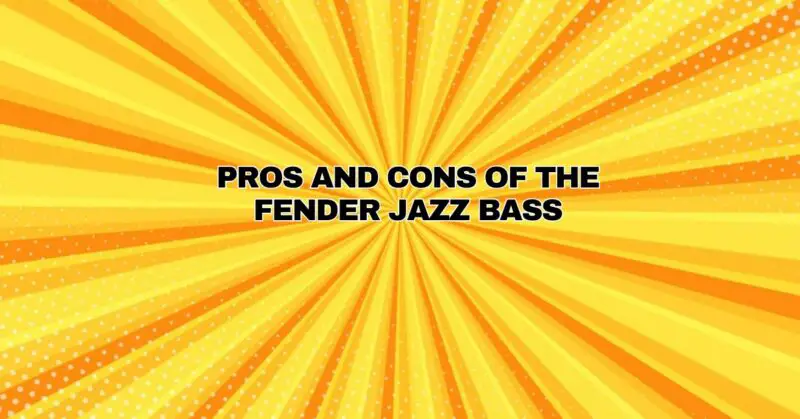The Fender Jazz Bass, often referred to as the J-Bass, is a legendary electric bass guitar that has left an indelible mark on the world of music. Introduced in 1960 as a complementary model to the Precision Bass, the Jazz Bass has become a favorite among bassists of all genres, from rock to jazz to funk and beyond. Its iconic design and unique tonal characteristics have made it a staple in the arsenal of countless bass players. In this article, we will examine the pros and cons of the Fender Jazz Bass to help you understand why it has maintained its popularity for over six decades.
Pros of the Fender Jazz Bass
- Versatile Sound: One of the most significant advantages of the Fender Jazz Bass is its versatility in terms of tonal options. With its dual single-coil pickups, it offers a wide range of tones, making it suitable for a variety of musical genres. You can achieve both warm, rounded tones and bright, punchy sounds, thanks to the independent volume controls for each pickup.
- Comfortable Neck: The Jazz Bass is known for its slim, fast-playing neck profile, which many bassists find extremely comfortable. It’s particularly well-suited for players with smaller hands or those who prefer a faster playing style.
- Balanced Weight: Fender has mastered the art of creating well-balanced instruments, and the Jazz Bass is no exception. It’s comfortable to wear on a strap for extended periods, thanks to its well-distributed weight.
- Iconic Design: The Jazz Bass boasts an iconic and timeless design that has remained largely unchanged since its inception. Its sleek, offset body shape and distinctive pickguard are instantly recognizable and have a classic appeal.
- Great for Slap and Funk Styles: Due to its brighter tonal characteristics and well-defined midrange, the Jazz Bass is often the preferred choice for bassists who specialize in slap bass and funk styles. Its clarity and articulation shine in these genres.
- Recording and Live Performance: The Jazz Bass is a popular choice for both recording sessions and live performances. Its versatile tonal palette makes it adaptable to various studio situations, and it can easily cut through a mix on stage.
- Resale Value: Fender Jazz Basses tend to hold their value well in the resale market. Vintage models, in particular, can appreciate significantly over time, making them attractive investments for collectors.
Cons of the Fender Jazz Bass
- Single-Coil Hum: One of the most common drawbacks of the Jazz Bass is the potential for single-coil hum, especially when both pickups are engaged. This can be mitigated with proper shielding and noise-cancelling pickups, but it’s a consideration for players in high-noise environments.
- Not Ideal for All Genres: While the Jazz Bass is versatile, it may not be the best choice for every genre. Some players prefer the deep, thumping tones of a Precision Bass for heavy rock or metal, and the Jazz Bass’s bright, clear sound may not suit every musical context.
- Cost: High-quality Fender Jazz Bass models can be relatively expensive. While there are budget-friendly options available, the premium models can be out of reach for some players.
- Complex Electronics: The dual single-coil pickup configuration with independent volume controls can be seen as a pro for tonal versatility, but it can also be perceived as complex for beginners. Some players may prefer a simpler setup.
- Neck Dive (on certain models): Some Jazz Bass models, especially those with certain body designs or weight distributions, may suffer from neck dive. This means that the neck-heavy balance can cause the neck to dip when played standing up, which can be uncomfortable for some players.
- Vintage Models Require Maintenance: While vintage Jazz Basses can be valuable and iconic, they often require more maintenance and care due to their age. Finding replacement parts or skilled technicians to work on vintage instruments can be challenging and costly.
Conclusion
The Fender Jazz Bass is undeniably an iconic and versatile instrument that has played a significant role in shaping the world of music. Its pros, including its versatile sound, comfortable neck, and balanced weight, have made it a beloved choice for bassists across genres. However, it’s essential to consider the potential drawbacks, such as single-coil hum and a relatively high cost, when choosing the Jazz Bass as your instrument of choice. Ultimately, the decision to play a Fender Jazz Bass should align with your musical preferences, playing style, and budget. For many, the Jazz Bass remains an enduring symbol of sonic flexibility and timeless design.


